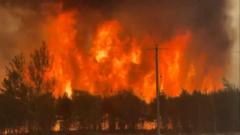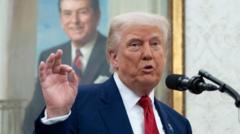Once a beacon of friendship between Canada and the U.S., the Haskell Free Library is now at the heart of tensions stemming from U.S. policies, forcing both nations to reassess their long-standing relationships.
U.S.-Canada Relations Tested as Library Straddles Border's Significance

U.S.-Canada Relations Tested as Library Straddles Border's Significance
A historic library symbolizing unity faces new challenges amid changing political climates and restrictions.
In the picturesque region where Quebec meets Vermont, the legacy of a wealthy widow’s vision for a library and opera house now faces uncertainty. Sylvie Boudreau, president of the Haskell Free Library and Opera House’s board of trustees, recalls a time when the majestic building, adorned in fine wood and stained glass, represented harmony between the two nations. The library, which rests on the shared border, included black tape to symbolize the line separating the nations while celebrating their interconnection.
However, recent U.S. political maneuvers have threatened this unity. Under the Trump administration, rising tariffs and suggestions of annexation have unsettled relationships between the two countries. A notable encounter involved a presidential envoy stepping over the taped boundary and proclaiming, "51st state" and "U.S.," shedding light on an underlying fear among Canadians about their neighbor to the south.
This diplomatic strain has forced Canadians to rethink their ties not only with the U.S. but with each other and the wider world, leading to ripple effects in communities along the 5,525-mile border—the world's longest unfortified boundary. Communities that once thrived alongside one another now grapple with uncertainty about cross-border connections.
In the border area around the Haskell Free Library and Opera House, the ideals of cooperation have endured since its establishment in 1904 by Martha Stewart Haskell. She conceptualized the library's location with equal access for citizens of both nations, aiming to foster kinship. Today, as restrictions loom, this symbol of binational friendship prompts a reflective dialogue about the essence of community and cooperation amidst evolving political landscapes.






















